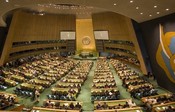5 july 2015
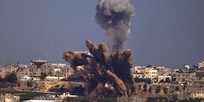
The Center for Political and Development Studies (CPDS) in Gaza today published its weekly report on the most important analyses and opinion articles on the Palestinian situation.
The first part of the report deals with Bassam Nasser’s analysis of the dialogue between Hamas and Salafi groups in Gaza.
Hamas member of the Palestinian Legislative Council (PLC), Salem Salama, recently revealed that the party has been engaged in an ‘intellectual dialogue’ with the Salafi supporters of the Islamic State (IS) in Gaza. He said that Hamas had opened up communication with Salafi members detained by the movement, in order to de-radicalize them and ‘make sure that Islam should not be implemented this way’.
Nasser’s argument in his analysis is that Hamas should continue and expand this dialogue in order to prevent IS theory from turning into Salafi practice in the Gaza Strip. He calls for Hamas to present a ‘positive image by promoting free speech’ and to use its ‘hundreds of scholars and preachers’ to dismantle the radicalism in intellectual thought processes and reduce infighting among Islamic groups.
The second part of the report focuses on Mohsien Saleh’s analysis of a potential truce with Israel and the possibility of Gaza’s separation from the West Bank.
Rumors of negotiations between Hamas and Israel have been circulating with such frequency that the occasional denials made by both parties have fallen on deaf ears. Saleh’s analysis is concerned with the different approaches of all parties involved- Hamas, the Palestinian Authority (PA), Israel, Egypt and the European Union (EU).
Compromises are to be made by both Israel and Hamas in the signing of a truce which would last for up to 5 years, including the reopening of Gaza’s crossings and the reconstructing of Gaza’s infrastructure.
Saleh points out, however, that Hamas is extremely ‘skeptical’ of truce offers as all promises of lifting the siege on Gaza have thus far yielded no concrete results. This is why, he says, Hamas’ interest in having guarantees is so obvious. He concluded that the truce should not involve the separation of Gaza from the West Bank.
The third and final part of the report is in regards to Hamas’ press statement on Independent Commission of Inquiry’s report on the 2014 Israeli assault on Gaza.
Hamas welcomed the report but included notes on its website which should be taken into consideration.
Hamas noted firstly that it had been fully cooperative with the Commission and had provided all necessary information for the formation of the report. It recognized that the resignation of the Commission’s President, William Schabus, under Israeli pressure had affected the outcome of the report, and condemned Israel’s refusal to cooperate with the Commission. Hamas said that Israel’s obstruction of the report had led to some inevitable inaccuracies. It implied that the fact Israel had prevented Commission members from visiting Gaza proved its guilt in the documented war crimes.
Hamas pointed out the report’s bias in favor of the Israeli occupation, saying that it used ‘skeptical terms’ and ‘lack of emphasis’ in the paragraphs concerning the occupation, whereas paragraphs dealing with Palestinian resistance used ‘confirmed phrases’ and ‘exaggerating terms’.
Hamas accused the Commission of using the word ‘tragic’ to describe the 6 Israeli civilian deaths during the aggressions, without adding any such adjective to the 2251 deaths of Palestinians.
Hamas also accused the Commission of going further than the tasks it was entrusted to fulfill in its intervention in Palestinian political matters.
The notes said that the Commission had confused military objects with civilian objects in regards to objects targeted by the Israeli Occupation Forces (IOF), calling it an ‘illegal, vindicating and an unjust approach’ on the part of the Commission.
The Commission’s report failed to include IOF soldier testimonies which confirmed that they had been ordered to target civilians, and ignored the horrific situation suffered by the 1.8m Gaza residents throughout the 51-day bombardment, despite its documentation of the ‘panic’ of thousands of Israeli citizens.
Hamas condemned the report’s acceptance of IOF policy to ‘warn’ of an impending attack by firing smaller missiles into the targeted areas, which included sites protected under international law such as hospitals, schools and shelters.
Finally, Hamas concluded its notes on the report by criticizing the lack of political and historical context for the aggression, pointing out that the latest aggression is the third of which to be launched on the trapped residents of the besieged Gaza Strip during the last 8 years.
Basem Nassar is a writer and researcher in Islamic thought based in Jordan.
Mohsien Saleh is the Chairman for Alzaytouna Center for Consultation and Research in Lebanon.
The first part of the report deals with Bassam Nasser’s analysis of the dialogue between Hamas and Salafi groups in Gaza.
Hamas member of the Palestinian Legislative Council (PLC), Salem Salama, recently revealed that the party has been engaged in an ‘intellectual dialogue’ with the Salafi supporters of the Islamic State (IS) in Gaza. He said that Hamas had opened up communication with Salafi members detained by the movement, in order to de-radicalize them and ‘make sure that Islam should not be implemented this way’.
Nasser’s argument in his analysis is that Hamas should continue and expand this dialogue in order to prevent IS theory from turning into Salafi practice in the Gaza Strip. He calls for Hamas to present a ‘positive image by promoting free speech’ and to use its ‘hundreds of scholars and preachers’ to dismantle the radicalism in intellectual thought processes and reduce infighting among Islamic groups.
The second part of the report focuses on Mohsien Saleh’s analysis of a potential truce with Israel and the possibility of Gaza’s separation from the West Bank.
Rumors of negotiations between Hamas and Israel have been circulating with such frequency that the occasional denials made by both parties have fallen on deaf ears. Saleh’s analysis is concerned with the different approaches of all parties involved- Hamas, the Palestinian Authority (PA), Israel, Egypt and the European Union (EU).
Compromises are to be made by both Israel and Hamas in the signing of a truce which would last for up to 5 years, including the reopening of Gaza’s crossings and the reconstructing of Gaza’s infrastructure.
Saleh points out, however, that Hamas is extremely ‘skeptical’ of truce offers as all promises of lifting the siege on Gaza have thus far yielded no concrete results. This is why, he says, Hamas’ interest in having guarantees is so obvious. He concluded that the truce should not involve the separation of Gaza from the West Bank.
The third and final part of the report is in regards to Hamas’ press statement on Independent Commission of Inquiry’s report on the 2014 Israeli assault on Gaza.
Hamas welcomed the report but included notes on its website which should be taken into consideration.
Hamas noted firstly that it had been fully cooperative with the Commission and had provided all necessary information for the formation of the report. It recognized that the resignation of the Commission’s President, William Schabus, under Israeli pressure had affected the outcome of the report, and condemned Israel’s refusal to cooperate with the Commission. Hamas said that Israel’s obstruction of the report had led to some inevitable inaccuracies. It implied that the fact Israel had prevented Commission members from visiting Gaza proved its guilt in the documented war crimes.
Hamas pointed out the report’s bias in favor of the Israeli occupation, saying that it used ‘skeptical terms’ and ‘lack of emphasis’ in the paragraphs concerning the occupation, whereas paragraphs dealing with Palestinian resistance used ‘confirmed phrases’ and ‘exaggerating terms’.
Hamas accused the Commission of using the word ‘tragic’ to describe the 6 Israeli civilian deaths during the aggressions, without adding any such adjective to the 2251 deaths of Palestinians.
Hamas also accused the Commission of going further than the tasks it was entrusted to fulfill in its intervention in Palestinian political matters.
The notes said that the Commission had confused military objects with civilian objects in regards to objects targeted by the Israeli Occupation Forces (IOF), calling it an ‘illegal, vindicating and an unjust approach’ on the part of the Commission.
The Commission’s report failed to include IOF soldier testimonies which confirmed that they had been ordered to target civilians, and ignored the horrific situation suffered by the 1.8m Gaza residents throughout the 51-day bombardment, despite its documentation of the ‘panic’ of thousands of Israeli citizens.
Hamas condemned the report’s acceptance of IOF policy to ‘warn’ of an impending attack by firing smaller missiles into the targeted areas, which included sites protected under international law such as hospitals, schools and shelters.
Finally, Hamas concluded its notes on the report by criticizing the lack of political and historical context for the aggression, pointing out that the latest aggression is the third of which to be launched on the trapped residents of the besieged Gaza Strip during the last 8 years.
Basem Nassar is a writer and researcher in Islamic thought based in Jordan.
Mohsien Saleh is the Chairman for Alzaytouna Center for Consultation and Research in Lebanon.
4 july 2015

File photo of a Palestinian protestor using a sling shot to repel a tear gas canister fired by Israeli forces
The Israeli Foreign Ministry has asked European countries for help in confronting the risk of their generals, political and security officials being arrested on charges of war crimes while abroad. This comes after the Palestinian Authority, along with a number of Muslim states, filed a complaint in the UN Human Rights Council on Tuesday demanding that a number of Israeli politicians and military officials be declared suspects of committing war crimes.
They also called for their arrest in countries where the law allows for this and for them to be questioned as to their involvement in last summer's war against Gaza.
Israel says Palestinians have planned a harsh campaign against Israel and that a number of countries who have joined in the complaint are committing grave human rights violations. However, the Palestinian action comes following encouragement from European countries.
Israeli Prime Minister Benjamin Netanyahu and Deputy Foreign Minister Tzipi Hotovely met with some foreign ambassadors and presented Israel's request. They also accused the UN Human Rights Council of being biased, as it overlooked Hamas's role in the war, which according to Israel "hid its weapons and fighters amongst civilians, thus putting their lives in danger".
The Israeli Foreign Ministry has asked European countries for help in confronting the risk of their generals, political and security officials being arrested on charges of war crimes while abroad. This comes after the Palestinian Authority, along with a number of Muslim states, filed a complaint in the UN Human Rights Council on Tuesday demanding that a number of Israeli politicians and military officials be declared suspects of committing war crimes.
They also called for their arrest in countries where the law allows for this and for them to be questioned as to their involvement in last summer's war against Gaza.
Israel says Palestinians have planned a harsh campaign against Israel and that a number of countries who have joined in the complaint are committing grave human rights violations. However, the Palestinian action comes following encouragement from European countries.
Israeli Prime Minister Benjamin Netanyahu and Deputy Foreign Minister Tzipi Hotovely met with some foreign ambassadors and presented Israel's request. They also accused the UN Human Rights Council of being biased, as it overlooked Hamas's role in the war, which according to Israel "hid its weapons and fighters amongst civilians, thus putting their lives in danger".
|
|
He pointed out that the positive vote on this resolution was a strong reminder of Israel’s obligation to commit to international humanitarian law and international human rights law, as well as to address issues fueling the conflict, such as the lack of Palestinian self-determination, the strict blockade on the Gaza Strip, the expansion of Israeli settlements (illegal under international law), and its refusal to implement the ICC’s resolution concerning the separation wall.
The resolution called on all concerned parties and EU organisations to implement the recommendations contained in the Council’s report, and called for the commitment of all represented states in the upholding of human rights. It called for the cooperation of all Israeli contractors to respect the 4th Geneva Convention and to respect international human rights law in the oPt, in accordance with Article 1 of the Geneva Conventions. It requested that the High Commissioner submit a report on the implementation of this resolution, as well as the implementation of the recommendations contained in the report made by the Independent Commission of Inquiry of the United Nations to the Human Rights Council at its eleventh session. Al-Maliki reiterated Palestine’s commitment and agreement with the resolution. The report pointed out that the targeting of civilians, and direct aggression against them, and against civilian sites, shelters, hospitals and protected places and the accompanying violation of the right to life is tantamount to a war crime, indicating that the settlements, and settler violence in the West Bank and Jerusalem form the basis of violations against Palestinian human rights. Al-Malaki said: “The highest Israeli political and military levels are involved in war crimes- crimes against humanity, namely Israel’s decision to assault Gaza and allow the targeting of civilians and the killing of children, in addition to the continuation of illegal settlement expansion.” All United Nations bodies and institutions and the international community called for the implementation of the decisions and recommendations of the resolution, the protection of the Palestinian people, and to ensure the right to a remedy and accountability. Finally, the resolution demanded that the international community enable Palestine to exercise its right to self-determination and the embodiment of an independent state, the State of Palestine with its capital in East Jerusalem. He said: “The state of Palestine’s quest for justice, the accountability of Israeli war criminals, and victory for the victims of our people, through the institutions of the international community and international law, is a step towards ending the occupation, and the achievement of independence.” |
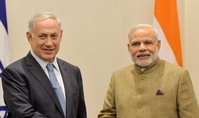
India strengthens its relationship to Israel by abstaining to vote in the Human Rights Council and continuing joint military and diplomatic efforts.
In an online article posted on Saturday, the Israeli newspaper Yedioth Ahronoth wrote about the improving relations between Israel and India in an unprecedented move in which India for the first time publicly announced that the Prime Minister will visit Israel in order to strengthen bilateral relations in many areas, most importantly the military.
The newspaper also mentioned that the relations between the two countries is currently in its golden age, and that India’s abstention in the Human Rights Council last week strengthened this relationship further. The resolution being debated in the Human Rights Council condemned Israel’s latest offensive on the Gaza Strip last summer, based on the findings of the United Nations Fact Finding Mission on the 2014 Israel-Gaza Conflict. India, Kenya, Ethiopia, Paraguay and Macedonia abstained from voting on the resolution and the United States voted against.
The newspaper quoted officials in the Israeli Foreign Ministry as saying that India’s abstention on the resolution is a victory for Israeli diplomacy, noting that India led the movement of non-aligned countries in support of Palestine for decades.
The reason for the change in the Indian position was said to be Narendra Modi, who became Prime Minister in India in April 2014 and who decided to change the Indian relations with Israel.
Political sources in Israel said that:
“the change in India’s position came in the form of it’s vote in the Human Rights Council as well as in the growth in relations between the leaders of the two countries through their common commitment to the issue of combating terrorism.”
The Indian opposition leader condemned the position of India and the Prime Minster, pointing out that this position may lead to the deterioration of relations between India and Arab countries, adding that his country has significant economic links with these countries. He also stated that the change in India’s official position took the Indian population by surprise, prompting the Indian foreign ministry to issue a statement confirming that India has not changed its stance towards the Palestinian cause.
The office of the Indian Prime Minister also issued an explanation of why India chose to abstain from voting in the Human Rights Council, in which India stated that it is not a member of the International Crime Court, and in which it calls for Israel and Palestine to adopt a policy of negotiations to end the differences between the two sides.
Yedioth said Israel expects a historic visit by the Indian Prime Minister to Israel at the end of the year or the beginning of next year. This will be the first visit by an Indian Prime Minister to Israel since the establishment of full diplomatic relations in 1992.
In February this year, Israeli defense minister Moshe Yaalon became the first Israeli minister to ever visit the Indian army. The two countries are currently planning to develop defense system program, and Israel is the second largest exporter of arms to India, the largest importer of arms in the world. This makes Israel the second-largest exporter of weapons to India after Russia in the first place and followed by the United States in the third place.
Israel has sold boats and naval artillery, rockets and unmanned aircraft as well as electrical equipment to India as the parties signed an arms deal in October 2014.
In an online article posted on Saturday, the Israeli newspaper Yedioth Ahronoth wrote about the improving relations between Israel and India in an unprecedented move in which India for the first time publicly announced that the Prime Minister will visit Israel in order to strengthen bilateral relations in many areas, most importantly the military.
The newspaper also mentioned that the relations between the two countries is currently in its golden age, and that India’s abstention in the Human Rights Council last week strengthened this relationship further. The resolution being debated in the Human Rights Council condemned Israel’s latest offensive on the Gaza Strip last summer, based on the findings of the United Nations Fact Finding Mission on the 2014 Israel-Gaza Conflict. India, Kenya, Ethiopia, Paraguay and Macedonia abstained from voting on the resolution and the United States voted against.
The newspaper quoted officials in the Israeli Foreign Ministry as saying that India’s abstention on the resolution is a victory for Israeli diplomacy, noting that India led the movement of non-aligned countries in support of Palestine for decades.
The reason for the change in the Indian position was said to be Narendra Modi, who became Prime Minister in India in April 2014 and who decided to change the Indian relations with Israel.
Political sources in Israel said that:
“the change in India’s position came in the form of it’s vote in the Human Rights Council as well as in the growth in relations between the leaders of the two countries through their common commitment to the issue of combating terrorism.”
The Indian opposition leader condemned the position of India and the Prime Minster, pointing out that this position may lead to the deterioration of relations between India and Arab countries, adding that his country has significant economic links with these countries. He also stated that the change in India’s official position took the Indian population by surprise, prompting the Indian foreign ministry to issue a statement confirming that India has not changed its stance towards the Palestinian cause.
The office of the Indian Prime Minister also issued an explanation of why India chose to abstain from voting in the Human Rights Council, in which India stated that it is not a member of the International Crime Court, and in which it calls for Israel and Palestine to adopt a policy of negotiations to end the differences between the two sides.
Yedioth said Israel expects a historic visit by the Indian Prime Minister to Israel at the end of the year or the beginning of next year. This will be the first visit by an Indian Prime Minister to Israel since the establishment of full diplomatic relations in 1992.
In February this year, Israeli defense minister Moshe Yaalon became the first Israeli minister to ever visit the Indian army. The two countries are currently planning to develop defense system program, and Israel is the second largest exporter of arms to India, the largest importer of arms in the world. This makes Israel the second-largest exporter of weapons to India after Russia in the first place and followed by the United States in the third place.
Israel has sold boats and naval artillery, rockets and unmanned aircraft as well as electrical equipment to India as the parties signed an arms deal in October 2014.
3 july 2015
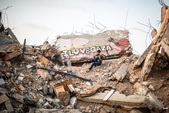
The UN's Human Rights Council on Friday stressed the urgency of ending the occupation of Palestinian territory and denounced Israel's refusal to cooperate with an independent commission on last year's Gaza conflict.
A resolution was voted for by 41 states with just the U.S. opposing the proposal in Geneva.
The resolution condemned the "non-cooperation by Israel with the independent commission of inquiry on the 2014 Gaza conflict and the refusal to grant access to or to cooperate with international human rights bodies seeking to investigate alleged violations of international law in the Occupied Palestinian Territory, including East Jerusalem."
It also stressed the "urgency of achieving without delay an end to the Israeli occupation that began in 1967" and denounced the 1,462 civilian deaths in Gaza in July and August, including 551 children and 299 women, as well as the deaths of six Israeli civilians.
Members said they were "gravely concerned by reports regarding serious human rights violations and grave breaches of international humanitarian law, including possible war crimes."
Israeli pressure resulted in the council omitting reference to possible war crimes, committed in the occupied territory in 2008, 2009 and 2014.
A resolution was voted for by 41 states with just the U.S. opposing the proposal in Geneva.
The resolution condemned the "non-cooperation by Israel with the independent commission of inquiry on the 2014 Gaza conflict and the refusal to grant access to or to cooperate with international human rights bodies seeking to investigate alleged violations of international law in the Occupied Palestinian Territory, including East Jerusalem."
It also stressed the "urgency of achieving without delay an end to the Israeli occupation that began in 1967" and denounced the 1,462 civilian deaths in Gaza in July and August, including 551 children and 299 women, as well as the deaths of six Israeli civilians.
Members said they were "gravely concerned by reports regarding serious human rights violations and grave breaches of international humanitarian law, including possible war crimes."
Israeli pressure resulted in the council omitting reference to possible war crimes, committed in the occupied territory in 2008, 2009 and 2014.
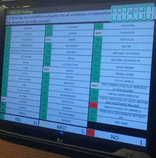
The list of countries and their votes on the resolution
Israeli envoy slams decision, calls adopted resolution 'an anti-Israeli manifesto' which ignores international law violations by Hamas.
The UN Human Rights Council on Friday voted to adopt a report made by a UN inquiry commission on Operation Protective Edge in Gaza last summer, calling on Israel and the Palestinians to prosecute alleged war crimes and to cooperate with the International Criminal Court's preliminary investigation.
Forty-one countries voted in favor of adopting the report, five abstained - India, Kenya, Ethiopia, Paraguay, Macedonia - and only one, the United States, voted against, saying it was biased against Israel.
European countries said they were disappointed it didn't explicitly mention rockets fired by Hamas toward civilian areas in Israel, but after hours of behind-the-scenes negotiations on the text, all European Union member states of the Council, including Britain, France and Germany, voted in favor.
The resolution underlined "the need to ensure that all those responsible for violations of international humanitarian law and international human rights law are held to account, through appropriate fair and independent domestic or international criminal justice mechanisms".
Israel's Ambassador to Geneva, Eviatar Manor, slammed the decision to adopt the report, saying, "Hans Christian Andersen wrote famously that the King is naked. So let me assume the role of the little boy in the story and tell you - this Council has lost its bearing."
Calling the adopted resolution "an anti-Israeli manifesto," Manor asserted that it "distorts the intention of the authors of the report by completely ignoring alleged violations of International Human Rights Law and International Humanitarian Law committed by Hamas and other Palestinian armed groups."
"Hamas continues to fire rockets and terror acts against Israelis go on as I speak," he added.
"So allow me to tell the truth about what Israel did in Gaza," Manor continued. "One - Israel defended its population against aggression by a terrorist organization. A terrorist organization which serially rejected every cease-fire proposed.
"Two - Israel went to extraordinary length to minimize the impact of the violence on Gaza's civilian population. It went to great length to warn the civilian population on impending strikes.
"Three - Israel is fully committed to investigating all alleged violations of the Laws of Armed Conflict. Israel's investigative mechanism has already filtered close to 200 cases. Over 100 of these cases have been handed over to the Military Advocate General.
"Four - however, Justice must be done, first and foremost. The Chair of the Commission of Inquiry has stated in her press conference that Israel has a robust system for investigating alleged violations. It must be allowed to complete its course.
"Five - Israel is carefully studying all reports on Operation Protective Edge, whatever their source, flaws or bias."
The commission determined that one third of Gaza dead during Protective Edge were children and urged both sides to cooperate with International Criminal Court investigations. Prime Minister Benjamin Netanyahu called the report biased.
Manor, in his address to the UNHRC on Friday, said that "we are not dealing here with fairness or moral integrity. We are dealing with a UN organ that is highly politicized, obsessive with Israel, ignoring serious situations of human rights violations across the globe and spending its scarce resources of money and manpower on reports on my country."
He accused the council of being "agent provocateur feeding the flames," saying it "failed to be a constructive player and promote rapprochement between Israelis and Palestinians."
'Human Rights Council doesn't care about the facts'
Israel's Foreign Ministry also criticized the decision to adopt the resolution, saying that "The Human Rights Council once again proved it is irrelevant and disconnected from reality. While the world around us burns in flames - a serious terrorist attack in Egypt, the continuation of anarchy in Syria, millions of refugees fleeing their homes - the council continues focusing on Israel."
"The resolution that was adopted today is a result of a Palestinian move meant to isolate Israel and tie its hands in the just fight against the terrorism of militant Islam. This council has so far adopted more unilateral resolutions against Israel than the sum total of resolutions adopted there against the rest of the world," the ministry went on to say.
The Foreign Ministry stressed that Israel, as "a law-abiding state with a legal system much respected in the world, is the only one that can investigate itself, as it does after every military campaign."
The ministry decried the fact the Palestinian Authority has not condemned nor has it convened a special meeting of the UNHRC in light of the recent terror attacks against Israelis.
Prime Minister Netanyahu slammed the decision, saying the Human Rights Council "does not care about the fact and does not really care about human rights."
"The today in which there is fire from Sinai at Israel, and while in Egypt the Islamic State is committing brutal terror attacks, in Syria Assad is slaughtering his people and in Iran the number of arbitrary executions rises every year - the UN's Human Rights Council decides to condemn the State of Israel, while it is innocent of any crime, the State of Israel that acted to defend itself from a murderous terror organization."
Defense Minister Moshe Ya'alon called the decision "absurd and farfetched."
Opposition MK Tzipi Livni (Zionist Union) also slammed the resolution, saying "at its foundation is a comparison between the IDF and Hamas, one-sidedness, and disregard to Hamas' crimes. Even in its 'softened' version it is unacceptable, as it gives the Palestinians more tools to prevent Israel from defending itself and is another step towards the International Criminal Court at The Hague."
Opposition MK Avigdor Lieberman (Yisrael Beytenu) said that while a rocket was fired at southern Israel, the UNHRC decided to adopt the UN report. "It's only another proof that this council is a mask behind which hide terror organizations and anti-Israeli organizations whose goal is to harm Israel," he said, calling on Netanyahu to cut ties with the Human Rights Council.
The Prime Minister's Office said Netanyahu had spoken to his counterparts in India, Kenya and Ethiopia over the past few days about the resolution, calls which eventually led these decisions to abstain from the vote.
India's decision to abstain from the vote is an unprecedented achievement for Israel. In the past, New Delhi has always voted against Israel. But since the election of Indian Prime Minister Narendra Modi and the warming of ties between the two countries, India has changed its voting pattern for the first time.
The PMO also expressed its appreciation to the US, the only country to oppose "the hypocritical condemnation" from the UN Human Rights Council.
However, Israel was disappointed with the fact many important Western states voted to adopt the decision, including France, Germany and Britain.
In order to ensure the passing of the resolution, the Palestinians had to soften the resolution, removing any call to action from the UNHRC, leaving it a merely symbolic decision.
Karim Lahidji, President of the Paris-based International Federation for Human Rights, said in a statement: "By supporting this milestone resolution, the EU sends a message that ... impunity will not prevail."
Israeli envoy slams decision, calls adopted resolution 'an anti-Israeli manifesto' which ignores international law violations by Hamas.
The UN Human Rights Council on Friday voted to adopt a report made by a UN inquiry commission on Operation Protective Edge in Gaza last summer, calling on Israel and the Palestinians to prosecute alleged war crimes and to cooperate with the International Criminal Court's preliminary investigation.
Forty-one countries voted in favor of adopting the report, five abstained - India, Kenya, Ethiopia, Paraguay, Macedonia - and only one, the United States, voted against, saying it was biased against Israel.
European countries said they were disappointed it didn't explicitly mention rockets fired by Hamas toward civilian areas in Israel, but after hours of behind-the-scenes negotiations on the text, all European Union member states of the Council, including Britain, France and Germany, voted in favor.
The resolution underlined "the need to ensure that all those responsible for violations of international humanitarian law and international human rights law are held to account, through appropriate fair and independent domestic or international criminal justice mechanisms".
Israel's Ambassador to Geneva, Eviatar Manor, slammed the decision to adopt the report, saying, "Hans Christian Andersen wrote famously that the King is naked. So let me assume the role of the little boy in the story and tell you - this Council has lost its bearing."
Calling the adopted resolution "an anti-Israeli manifesto," Manor asserted that it "distorts the intention of the authors of the report by completely ignoring alleged violations of International Human Rights Law and International Humanitarian Law committed by Hamas and other Palestinian armed groups."
"Hamas continues to fire rockets and terror acts against Israelis go on as I speak," he added.
"So allow me to tell the truth about what Israel did in Gaza," Manor continued. "One - Israel defended its population against aggression by a terrorist organization. A terrorist organization which serially rejected every cease-fire proposed.
"Two - Israel went to extraordinary length to minimize the impact of the violence on Gaza's civilian population. It went to great length to warn the civilian population on impending strikes.
"Three - Israel is fully committed to investigating all alleged violations of the Laws of Armed Conflict. Israel's investigative mechanism has already filtered close to 200 cases. Over 100 of these cases have been handed over to the Military Advocate General.
"Four - however, Justice must be done, first and foremost. The Chair of the Commission of Inquiry has stated in her press conference that Israel has a robust system for investigating alleged violations. It must be allowed to complete its course.
"Five - Israel is carefully studying all reports on Operation Protective Edge, whatever their source, flaws or bias."
The commission determined that one third of Gaza dead during Protective Edge were children and urged both sides to cooperate with International Criminal Court investigations. Prime Minister Benjamin Netanyahu called the report biased.
Manor, in his address to the UNHRC on Friday, said that "we are not dealing here with fairness or moral integrity. We are dealing with a UN organ that is highly politicized, obsessive with Israel, ignoring serious situations of human rights violations across the globe and spending its scarce resources of money and manpower on reports on my country."
He accused the council of being "agent provocateur feeding the flames," saying it "failed to be a constructive player and promote rapprochement between Israelis and Palestinians."
'Human Rights Council doesn't care about the facts'
Israel's Foreign Ministry also criticized the decision to adopt the resolution, saying that "The Human Rights Council once again proved it is irrelevant and disconnected from reality. While the world around us burns in flames - a serious terrorist attack in Egypt, the continuation of anarchy in Syria, millions of refugees fleeing their homes - the council continues focusing on Israel."
"The resolution that was adopted today is a result of a Palestinian move meant to isolate Israel and tie its hands in the just fight against the terrorism of militant Islam. This council has so far adopted more unilateral resolutions against Israel than the sum total of resolutions adopted there against the rest of the world," the ministry went on to say.
The Foreign Ministry stressed that Israel, as "a law-abiding state with a legal system much respected in the world, is the only one that can investigate itself, as it does after every military campaign."
The ministry decried the fact the Palestinian Authority has not condemned nor has it convened a special meeting of the UNHRC in light of the recent terror attacks against Israelis.
Prime Minister Netanyahu slammed the decision, saying the Human Rights Council "does not care about the fact and does not really care about human rights."
"The today in which there is fire from Sinai at Israel, and while in Egypt the Islamic State is committing brutal terror attacks, in Syria Assad is slaughtering his people and in Iran the number of arbitrary executions rises every year - the UN's Human Rights Council decides to condemn the State of Israel, while it is innocent of any crime, the State of Israel that acted to defend itself from a murderous terror organization."
Defense Minister Moshe Ya'alon called the decision "absurd and farfetched."
Opposition MK Tzipi Livni (Zionist Union) also slammed the resolution, saying "at its foundation is a comparison between the IDF and Hamas, one-sidedness, and disregard to Hamas' crimes. Even in its 'softened' version it is unacceptable, as it gives the Palestinians more tools to prevent Israel from defending itself and is another step towards the International Criminal Court at The Hague."
Opposition MK Avigdor Lieberman (Yisrael Beytenu) said that while a rocket was fired at southern Israel, the UNHRC decided to adopt the UN report. "It's only another proof that this council is a mask behind which hide terror organizations and anti-Israeli organizations whose goal is to harm Israel," he said, calling on Netanyahu to cut ties with the Human Rights Council.
The Prime Minister's Office said Netanyahu had spoken to his counterparts in India, Kenya and Ethiopia over the past few days about the resolution, calls which eventually led these decisions to abstain from the vote.
India's decision to abstain from the vote is an unprecedented achievement for Israel. In the past, New Delhi has always voted against Israel. But since the election of Indian Prime Minister Narendra Modi and the warming of ties between the two countries, India has changed its voting pattern for the first time.
The PMO also expressed its appreciation to the US, the only country to oppose "the hypocritical condemnation" from the UN Human Rights Council.
However, Israel was disappointed with the fact many important Western states voted to adopt the decision, including France, Germany and Britain.
In order to ensure the passing of the resolution, the Palestinians had to soften the resolution, removing any call to action from the UNHRC, leaving it a merely symbolic decision.
Karim Lahidji, President of the Paris-based International Federation for Human Rights, said in a statement: "By supporting this milestone resolution, the EU sends a message that ... impunity will not prevail."
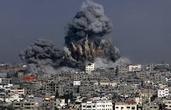
Charge d’Affaires of the Permanent Observer Mission of the State of Palestine to the United Nations, Feda Abdelhady-Nasser, yesterday released a very strongly-worded letter condemning the UN Security Council’s silence on crimes committed by Israel in the occupied Palestinian territories (oPt), and urging the Council to demand that Israel act in accordance with international law.
In the letter, addressed to H.E. Gerard Jacobus van Bohemen, President of the UN Security Council, Nasser drew attention to the fact that the situation of the Palestinian people under Israeli occupation remains dire. She attributed this to Israel’s ‘grave violation of international humanitarian law and human rights law’, to its ‘blatant rejection of peace’, and the ‘devastating military aggression against the Palestinian people’ that Israel launched in the summer of last year.
Nasser reported Israeli policies aimed at controlling ‘every aspect of Palestinian life’ in a process of subjugation, collective punishment and dehumanization affecting every social demographic of the Palestinian civilian population- ‘whether children, women or men, elderly or disabled, prisoners or detainees, refugees or displaced’.
Nasser recalled the ‘heinous’ crime of last year when Mohammed Abu Khdeir (16) was ‘abducted from the street outside his home…beaten and driven to a forest, where he was burned alive by a gang of terrorist Israeli settlers’. She expressed her disgust at the impunity that the Israeli government has allow Israeli setters who have ‘so vilely and continuously assaulted Palestinian civilians’, as well as solidarity with ‘Mohammed’s parents in demanding accountability for the killing of their child’.
She reiterated calls for Israel to be included on the list of violators of child rights during armed conflict in the face of ‘ongoing violations and crimes against our innocent and defenseless children’.
In a section of the letter concerning civilian casualties caused by Israeli Occupation Forces (IOF), Nasser spoke out against the death of Abdullah Eyad Ghneimat (22) after he was shot and run over by an Israeli military jeep which then flipped onto him. He was left, bleeding to death, under the jeep for three hours. His back was crushed and his leg completely severed, but the Israeli soldiers obstructed emergency assistance. Nasser also spoke of the death of 3-year-old Yasser Shammas in a settler hit and run attack, as well as the beating of Shadi al-Ghobashi after he pleaded to the IOF to stop firing teargas and end his children’s suffering.
Nasser documented the continuation of the IOF’s use of live ammunition against Palestinian citizens, including children, within the West Bank, East Jerusalem, Gaza and the seas off the coast of Gaza. In the last three months, 13 Palestinians have been killed in IOF and settler attacks- the latest being Mohammed Hani al-Kasaba, who was shot at Qalandia today.
She condemned the impunity for such crimes, saying that it fostered a ‘cynical disregard for Palestinian life and encourages the perpetration of more crimes’ against the Palestinian people.
In her letter to the UN Security Council, Nasser stated that in the last 3 months again, approximately 1,118 Palestinians, including children, had been arrested and detained. Just from June 15-28, 156 Palestinians were detained during a number of military operations in the West Bank.
She said:
“This pattern of targeting Palestinian children, through killing, maiming and detention, clearly aims to disrupt the Palestinian family and community life, and depriving Palestinian children and youth from development and education destroying the hopes for a viable Palestinian society.
“We reiterate our demand for an end to Israel’s arrest of Palestinian civilians, an end to their abuse and torture in captivity,and for the release of all Palestinians imprisoned and detained by Israel and respect for international humanitarian and human rights law”.
She added that the suffering of Palestinian detainee Khader Adnan (37), caused by his repeated imprisonment in Israeli prisons under administrative detention orders, had drawn attention to the ‘appalling injustice and abuse by the occupying Power against the Palestinian people’.
The ‘illegal blockade of the Gaza Strip in flagrant collective punishment of the 1.8 million Palestinians there’ was also condemned, and attention brought to the challenges faced by UNRWA (Palestinian refugee aid organization) caused by an unprecedented funding crisis.
Nasser spoke in her letter of the continued expansion in the West Bank of Israeli settlements, which are illegal under international law. She said that these settlements fragment Palestinian society and lead to the forced displacement of Palestinian civilians, as well as the destruction of land and natural resourses- including the uprooting of around 20,000 five-year-old olive saplings near Tubas city on the grounds that the land is a designated firing zone for the IOF.
She concluded her letter by urging the UN Security Council not to remain ‘silent’ in the fact of these ‘flagrant’ violations of basic human rights. She demanded that the Security Council and the international community ‘act collectively to ensure de-escalation of this grave situation’.
“The Palestinian people, along with people across the region and around the globe, continue to look to the Council to uphold its Charter duties, uphold the rule of law and uphold human rights in order to establish and preserve peace and security in our world in all cases without exception.”
In the letter, addressed to H.E. Gerard Jacobus van Bohemen, President of the UN Security Council, Nasser drew attention to the fact that the situation of the Palestinian people under Israeli occupation remains dire. She attributed this to Israel’s ‘grave violation of international humanitarian law and human rights law’, to its ‘blatant rejection of peace’, and the ‘devastating military aggression against the Palestinian people’ that Israel launched in the summer of last year.
Nasser reported Israeli policies aimed at controlling ‘every aspect of Palestinian life’ in a process of subjugation, collective punishment and dehumanization affecting every social demographic of the Palestinian civilian population- ‘whether children, women or men, elderly or disabled, prisoners or detainees, refugees or displaced’.
Nasser recalled the ‘heinous’ crime of last year when Mohammed Abu Khdeir (16) was ‘abducted from the street outside his home…beaten and driven to a forest, where he was burned alive by a gang of terrorist Israeli settlers’. She expressed her disgust at the impunity that the Israeli government has allow Israeli setters who have ‘so vilely and continuously assaulted Palestinian civilians’, as well as solidarity with ‘Mohammed’s parents in demanding accountability for the killing of their child’.
She reiterated calls for Israel to be included on the list of violators of child rights during armed conflict in the face of ‘ongoing violations and crimes against our innocent and defenseless children’.
In a section of the letter concerning civilian casualties caused by Israeli Occupation Forces (IOF), Nasser spoke out against the death of Abdullah Eyad Ghneimat (22) after he was shot and run over by an Israeli military jeep which then flipped onto him. He was left, bleeding to death, under the jeep for three hours. His back was crushed and his leg completely severed, but the Israeli soldiers obstructed emergency assistance. Nasser also spoke of the death of 3-year-old Yasser Shammas in a settler hit and run attack, as well as the beating of Shadi al-Ghobashi after he pleaded to the IOF to stop firing teargas and end his children’s suffering.
Nasser documented the continuation of the IOF’s use of live ammunition against Palestinian citizens, including children, within the West Bank, East Jerusalem, Gaza and the seas off the coast of Gaza. In the last three months, 13 Palestinians have been killed in IOF and settler attacks- the latest being Mohammed Hani al-Kasaba, who was shot at Qalandia today.
She condemned the impunity for such crimes, saying that it fostered a ‘cynical disregard for Palestinian life and encourages the perpetration of more crimes’ against the Palestinian people.
In her letter to the UN Security Council, Nasser stated that in the last 3 months again, approximately 1,118 Palestinians, including children, had been arrested and detained. Just from June 15-28, 156 Palestinians were detained during a number of military operations in the West Bank.
She said:
“This pattern of targeting Palestinian children, through killing, maiming and detention, clearly aims to disrupt the Palestinian family and community life, and depriving Palestinian children and youth from development and education destroying the hopes for a viable Palestinian society.
“We reiterate our demand for an end to Israel’s arrest of Palestinian civilians, an end to their abuse and torture in captivity,and for the release of all Palestinians imprisoned and detained by Israel and respect for international humanitarian and human rights law”.
She added that the suffering of Palestinian detainee Khader Adnan (37), caused by his repeated imprisonment in Israeli prisons under administrative detention orders, had drawn attention to the ‘appalling injustice and abuse by the occupying Power against the Palestinian people’.
The ‘illegal blockade of the Gaza Strip in flagrant collective punishment of the 1.8 million Palestinians there’ was also condemned, and attention brought to the challenges faced by UNRWA (Palestinian refugee aid organization) caused by an unprecedented funding crisis.
Nasser spoke in her letter of the continued expansion in the West Bank of Israeli settlements, which are illegal under international law. She said that these settlements fragment Palestinian society and lead to the forced displacement of Palestinian civilians, as well as the destruction of land and natural resourses- including the uprooting of around 20,000 five-year-old olive saplings near Tubas city on the grounds that the land is a designated firing zone for the IOF.
She concluded her letter by urging the UN Security Council not to remain ‘silent’ in the fact of these ‘flagrant’ violations of basic human rights. She demanded that the Security Council and the international community ‘act collectively to ensure de-escalation of this grave situation’.
“The Palestinian people, along with people across the region and around the globe, continue to look to the Council to uphold its Charter duties, uphold the rule of law and uphold human rights in order to establish and preserve peace and security in our world in all cases without exception.”
2 july 2015
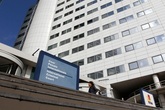
Sudan is not optimistic that the International Criminal Court would do justice for the Palestinian people regarding the crimes committed by Israel, the country's permanent representative to the Arab League said. In exclusive statements to Al-Quds newspaper, Salah Abdel Mahmoud Abdel Halim said the United States criticised Palestine for going to the International Criminal Court, adding that the ICC is politicised and does not value justice.
He explained that the United States is now calling for not involving the International Criminal Court in the Palestinian issue, which shows the double standards.
Abdel Halim continued: "When it comes to Sudan, the International Criminal Court moves against it, but when the issue is about the massacres committed by the racist Israeli regime in Palestine, the court will do nothing."
He explained that the United States is now calling for not involving the International Criminal Court in the Palestinian issue, which shows the double standards.
Abdel Halim continued: "When it comes to Sudan, the International Criminal Court moves against it, but when the issue is about the massacres committed by the racist Israeli regime in Palestine, the court will do nothing."
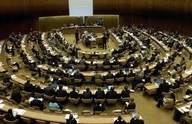
The UN Human Rights Council is expected Thursday to vote over the international commission of inquiry’s report into Israel’s summer aggression on Gaza.
The report on the 2014 Gaza aggression was released last week. It concluded that Israeli forces had committed war crimes. The organization also accepted the Palestinian death count, which estimated that 65 percent of those killed in the aggression were civilians, or 1,462 out of a total of 2,251 Palestinians killed.
Haaretz Hebrew newspaper quoted an Israeli senior official as saying that the Palestinian resolution that will be brought to a vote on Thursday in the United Nations Human Rights Council is expected to be harshly critical of Israel.
However, the report will not contain a demand for sanctions or any concrete moves against Israel, as indicated by an initial draft of the proposal due to the European and U.S. pressures, the newspaper added.
European parties and U.S. administration informed Israel that the Palestinian draft resolution will not include demands for any concrete steps against it, according to the Israeli official.
The UN report condemn Israel for committing human rights violations during its 2014 war on Gaza, holding Israeli authorities responsibility for preventing a Palestinian independent investigation into the war crimes reported in Gaza.
The report on the 2014 Gaza aggression was released last week. It concluded that Israeli forces had committed war crimes. The organization also accepted the Palestinian death count, which estimated that 65 percent of those killed in the aggression were civilians, or 1,462 out of a total of 2,251 Palestinians killed.
Haaretz Hebrew newspaper quoted an Israeli senior official as saying that the Palestinian resolution that will be brought to a vote on Thursday in the United Nations Human Rights Council is expected to be harshly critical of Israel.
However, the report will not contain a demand for sanctions or any concrete moves against Israel, as indicated by an initial draft of the proposal due to the European and U.S. pressures, the newspaper added.
European parties and U.S. administration informed Israel that the Palestinian draft resolution will not include demands for any concrete steps against it, according to the Israeli official.
The UN report condemn Israel for committing human rights violations during its 2014 war on Gaza, holding Israeli authorities responsibility for preventing a Palestinian independent investigation into the war crimes reported in Gaza.
30 june 2015
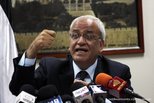
Saeb Erekat
A member of the Palestinian Liberation Organisation's Executive Committee, Saeb Erekat , has confirmed that the file submitted to the International Criminal Court includes the crimes of the occupation since 1967. In the intervening years, Israel has arrested 850,000 Palestinian citizens and a further 209 prisoners were killed in its detention camps.
In his remarks on Monday to local radio station Mawteni, Erekat said that: "We highlighted the medical negligence and torture carried about by the occupation's authorities against the prisoners."
Commenting on the organised campaign waged by Israeli media to defame Palestinian Authority President Mahmoud Abbas and the Palestinian leadership, Erekat said: "President Mahmoud Abbas takes the Palestinian issue to all international forums, and this displeases Israel, which does not want that the Palestinian people's leadership to speak in front of the world and disclose its crimes."
He described Israeli media as "destructive" and said that its "cheap methods" will not affect the consciousness of the Palestinian people.
A member of the Palestinian Liberation Organisation's Executive Committee, Saeb Erekat , has confirmed that the file submitted to the International Criminal Court includes the crimes of the occupation since 1967. In the intervening years, Israel has arrested 850,000 Palestinian citizens and a further 209 prisoners were killed in its detention camps.
In his remarks on Monday to local radio station Mawteni, Erekat said that: "We highlighted the medical negligence and torture carried about by the occupation's authorities against the prisoners."
Commenting on the organised campaign waged by Israeli media to defame Palestinian Authority President Mahmoud Abbas and the Palestinian leadership, Erekat said: "President Mahmoud Abbas takes the Palestinian issue to all international forums, and this displeases Israel, which does not want that the Palestinian people's leadership to speak in front of the world and disclose its crimes."
He described Israeli media as "destructive" and said that its "cheap methods" will not affect the consciousness of the Palestinian people.
